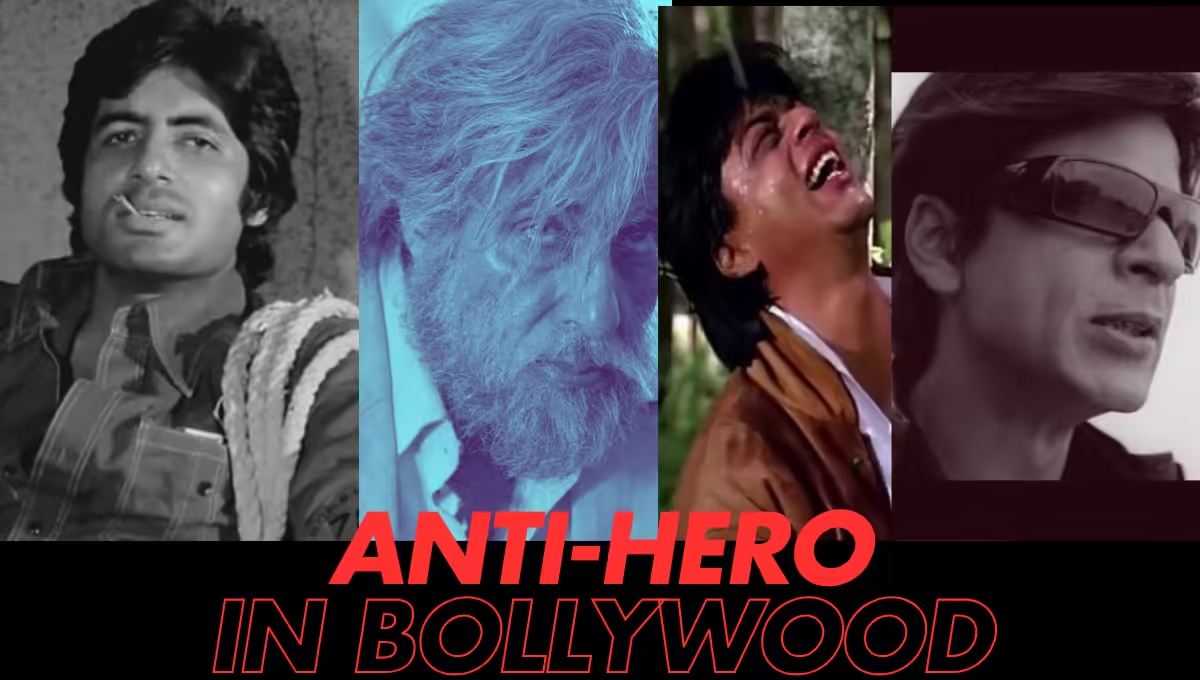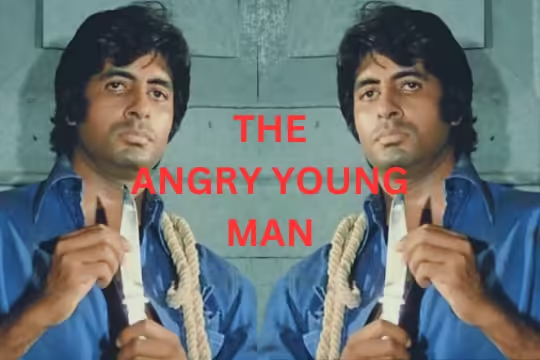
Bollywood has always been known for its heroes—strong, noble characters who stand for justice and triumph over evil. However, as the years passed, audiences began craving something different, something more relatable. This shift led to the rise of the anti-hero in Bollywood, a character who is neither fully good nor entirely bad but stands somewhere in between. From Amitabh Bachchan’s intense roles in the 1970s to Shah Rukh Khan’s complex characters in the 1990s and 2000s, the anti-hero has brought a fresh, exciting twist to Indian cinema.
In Deewar, Bachchan’s character, Vijay, turns to crime not out of greed but because he is a product of a corrupt system.
Article Highlights
Amitabh Bachchan: The Angry Young Man
In the 1970s, Amitabh Bachchan revolutionized Indian cinema with his portrayal of the anti-hero in Bollywood through the iconic “Angry Young Man” roles. Films like Zanjeer (1973), Deewar (1975), and Sholay (1975) introduced audiences to a new kind of hero—one who didn’t always abide by the rules and often operated outside the law. Bachchan’s characters weren’t your traditional heroes; they were men filled with rage and frustration. But it was precisely this anger that resonated with the masses. The struggles of these anti-heroes mirrored the frustrations of an entire generation.

Also read: Mithun Chakraborty: From Disco Dancer to Dadasaheb Phalke Award Winner
In Deewar, Bachchan’s character, Vijay, turns to crime, not out of greed but because he is a product of a corrupt system. His infamous line, “Aaj Khush To Bahut Hoge Tum” spoken in a heartfelt conversation with God, encapsulates the emotional depth and turmoil of the anti-hero in Bollywood. Vijay’s journey in Deewar showcased the plight of a man fighting against an unfair system—a narrative that hit close to home for many viewers. His anti-heroic persona was not born from a desire for evil but from a deep sense of injustice.
The anti-hero in Bollywood is not just a character type; it’s a reflection of the complexities of real life—full of flaws, struggles, and contradictions.
Shah Rukh Khan: The Romantic Anti-Hero
Fast forward to the 1990s, and Shah Rukh Khan introduced a new layer to the concept of the anti-hero in Bollywood. Unlike Bachchan’s rage-filled characters, Khan’s anti-heroes were emotional, obsessive, and manipulative. One of his most iconic anti-hero roles in Bollywood came in Baazigar (1993), where Khan portrayed a man bent on revenge. His character commits multiple dark deeds, including murder, but what made this role fascinating was how the audience still empathized with him. His motives, though violent, were rooted in personal loss, making him a more complex anti-hero.
Khan followed this up with Darr (1993), where he played an obsessive lover who would stop at nothing to be with the woman he adored. His thrilling delivery of the line, “K…K…Kiran” became an iconic moment in Bollywood history. Though his character was terrifying, audiences couldn’t help but feel a tinge of sympathy for his pain and longing. Shah Rukh Khan’s anti-hero in Bollywood was a masterclass in depicting morally ambiguous characters who straddled the line between villainy and vulnerability.
The Changing Taste of the Indian Audience
By the time Shah Rukh Khan began portraying the anti-hero in Bollywood, the tastes of Indian audiences had shifted significantly. Gone were the days when people only wanted to see flawless, righteous heroes. The new demand was for characters with depth, imperfections, and real-world struggles. Audiences found themselves drawn to anti-heroes because these characters mirrored the complexities of real life. They weren’t perfect, but they were authentic.
Today, the anti-hero in Bollywood has evolved even further, becoming an integral part of modern Indian cinema. Characters like Kabir in Kabir Singh (2019) or the violent figures in Gangs of Wasseypur (2012) represent a new breed of anti-heroes.
The rise of the anti-hero in Bollywood allowed filmmakers to explore more nuanced and intricate storylines. Directors started focusing on grey characters, where good and bad weren’t always clearly defined. Amitabh Bachchan’s “Angry Young Man” and Shah Rukh Khan’s emotionally driven anti-heroes helped pave the way for this shift in storytelling. This evolution signified a departure from the simple “good versus evil” narrative, embracing more layered character arcs.
The Modern Anti-Hero: Real and Relatable
Today, the anti-hero in Bollywood has evolved even further, becoming an integral part of modern Indian cinema. Characters like Kabir in Kabir Singh (2019) or the violent figures in Gangs of Wasseypur (2012) represent a new breed of anti-heroes. These characters often embody traits that are morally questionable, yet their stories are raw, real, and relatable. The modern anti-hero in Bollywood does not shy away from showcasing the darker aspects of human nature, but this honesty is precisely what makes them so compelling.
Modern anti-heroes, like their predecessors, do not fit into the typical mould of good or bad. Instead, they navigate the grey areas of life, making choices that, while not always ethical, feel genuine to the audience. These characters are flawed and unapologetic, but their authenticity is what keeps the viewers invested in their journey.
A New Definition of Heroism
The rise of the anti-hero in Bollywood, from Amitabh Bachchan’s “Angry Young Man” to Shah Rukh Khan’s emotional and manipulative anti-heroes, has reshaped Indian cinema in profound ways. These characters challenge traditional ideas of morality, forcing audiences to rethink what it means to be a hero. The anti-hero in Bollywood is not just a character type; it’s a reflection of the complexities of real life—full of flaws, struggles, and contradictions.
As Bollywood continues to evolve, the appeal of the anti-hero shows no signs of fading. Characters who blur the lines between right and wrong, who embody the messiness of the human experience, will continue to captivate audiences. The anti-hero in Bollywood is here to stay, reflecting the imperfect realities that we all face in our lives.
Also, read the latest on Trend India Now